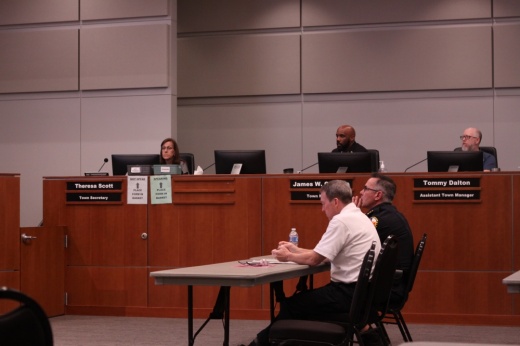Town Manager James Childers said town staff and several stakeholders met Oct. 31.
“We shared a lot of good information, which leads to what I’m about to share with you,” Childers said. “It is my belief that our next step in this process is to put together a task force.”
The details
At a Nov. 21 meeting, Childers told council members he and staff have been in discussions for months about mental health and substance abuse issues in Flower Mound.
In part, Childers hopes a task force will help identify gaps in the town’s response to substance abuse and mental illness.
“Enhancing collaboration goes part and parcel with that,” he said. “We want to make sure we’re fostering partnerships.”
The task force would be a temporary measure to find a sustainable solution. He said the groups he and town staff met with expressed that they were ready to participate and be engaged in this process. Some of the stakeholders involved included the Denton County MHMR Center, the North Texas-based Recovery Resource Council, the local municipal court and Denton County.
Zooming in
Childers also said he hopes the town can partner with local faith organizations on the effort too.
“This is not an exhaustive list,” Childers said. “This is the beginning.”
In Flower Mound, first responders received 145 calls designated as overdose calls since 2022, according to previous Community Impact reporting. About 38 of those involved opioids, with seven incidents involving people younger than 18.
Council member Brian Taylor asked what specific goals the task force may have, suggesting one of them could be figuring out what to do with the town’s opioid settlement funds. Childers said the town has about $81,000 in funds secured by the state through settlements with pharmaceutical companies involved with the production, distribution or sale of opioids. A new settlement agreement saw the town receive another $16,000.
“I think this is the proper conduit to determine if those funds could be leveraged for something that another entity can move forward,” Childers said.
Those opposed
Mayor Cheryl Moore recommended putting together a board or commission to tackle these issues but council member Ann Martin said she wanted more definition and expectations behind the proposal.
“I do not want to have a board or commission,” Martin said. “I think that’s way over our skis. Our county doesn’t even provide mental health services.”
Instead, Denton County directs people to substance abuse and mental health resources. To Martin, what Childers suggested sounded more like a concentrated round table effort, opposed to a task force.
“I am feeling a little bit rushed,” Martin said of the task force. “I know we very much want to come up with all the solutions, but if it were that easy, it would have been done by now.”
What's next?
Childers said he, staff and the other stakeholders would meet and work on solidifying the plans for the task force before moving any further.
Council member Adam Schiestel, deputy mayor pro tem, suggested the task force work solely on how to spend the opioid settlement funds and then dissolve. He feared that without a specific goal, the task force wouldn’t be effective.
“I hear you loud and clear,” Childers said. “We can come back and give you an update after the first meeting or so just to say, ‘here’s how things start crystalizing,'” so we don’t run into a scenario that you talked about.”
The proposed task force will be brought back to council for further consideration at a future meeting. Childers said the task force could begin meeting early next year.





